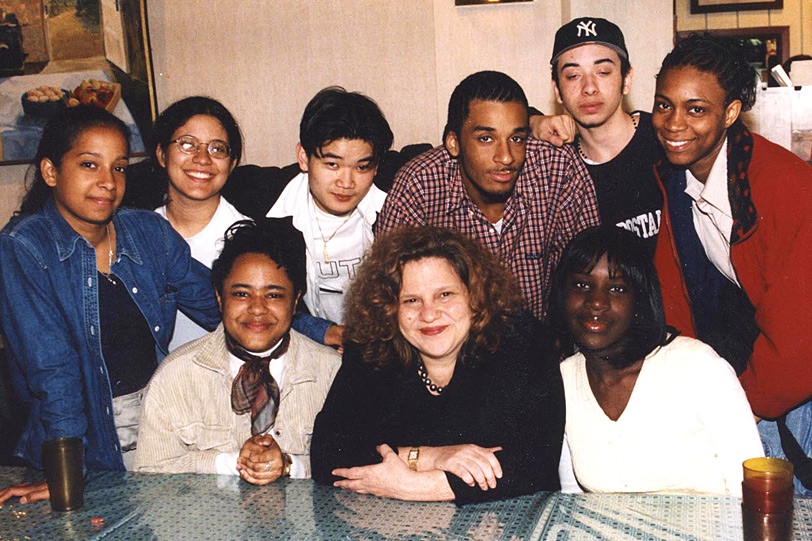
Opening Doors to Theatre
Theatre Development Fund (TDF) is being honored by the American Theatre Wing’s Tony Awards this June for its innovative, 14-year-old Open Doors program. TDF is one of three recipients of 2012 Tony Honors for Excellence in the Theatre, which are bestowed on individuals and institutions that are not eligible in the 26 competitive Tony Award categories.
Open Doors partners with selected high schools within the New York City school system to introduce underserved students to live theatre. Participants attend six productions a year; gather after each show for a 90-minute post-performance discussion over pizza and soda, with a mentor drawn from the theatre industry; and record their reflections in a journal, which, at the end of the year, they share with their teachers.
What started as a single group of eight students in 1998 has blossomed to 22 groups in 2012, with professional mentors ranging from playwrights Lynn Nottage and David Henry Hwang to former New York Times critic Frank Rich.
This is the second time TDF has been recognized by the Tonys—the organization as a whole received a Special Tony Award in 1974 when it was cited for its revolutionary TKTS discount ticket booth.
Below, TDF Executive Director Victoria Bailey talks about Open Doors.
How did Open Doors begin?
It started with the late playwright Wendy Wasserstein and her longtime production stage manager, Roy Harris. Wendy had this idea about taking New York City school kids to the theatre and seeing whether or not the kids would think it was relevant. They tried it out that year, and at the end of the season, Wendy said to them, “You think we should do this again?” And they all said yes. After that, Wendy would reach out to friends of hers in the business and sign them on as mentors to the groups.
Are there special qualifications to be chosen for the program?
No, the teachers at the selected schools identify motivated students who they think might be good candidates. And the kids apply for an Open Doors scholarship by writing an essay. But there are no other criteria. We’re beginning to hear from a lot of young adults who’ve gone through the program and have continued to go to the theatre after that. We had one who, like a majority of the kids in the program, had never been to the theatre. She became an Open Doors scholar, went to college, and became a teacher in the New York City high school system. And right away, she went to her new principal and said, “I want my kids participating in TDF’s program.”
How are the mentors chosen now?
It’s important that they are people in the field who have a strong understanding of the craft and come up with the right questions to ask the kids. “How is a play put together?” “How does a particular design work?” “What do you think of their use of light?” “Do you think that playwright’s choice reinforces the point we were just talking about?” It’s helping the kids understand how a work of art gets put together. That’s what makes them become active theatregoers. By now, we also have, I think, two groups focused on dance. Lar Lubovitch came to us six or seven years ago and asked if we could have that. Dancer/choreographers Miguel Gutierrez and Aubrey Lynch mentored them this year. For some students, it’s not just the impact of going to the performances, but participating in those discussions afterwards. They learn how to discuss it. And how to disagree. Often we’ll hear that a student will hold back in a discussion because a bunch of the kids will be enthusiastic about a show and that one kid didn’t like it. But when their opinion is drawn out, you can watch it have an impact on the other students. It takes them all more deeply into the conversation, looking at things differently.
From TDF’s founding in 1968, the chief focus was making shows accessible to people who couldn’t otherwise attend, either because they couldn’t afford them or because through certain disabilities, they couldn’t see or hear them. But starting in 1995, just 17 years ago, there was a jump in educational outreach programs, such as Open Doors. What accounts for that sudden expansion of TDF’s mission?
The timing was not a coincidence. I was at Manhattan Theatre Club in the early 1990s and a lot of their educational programs started then as well. You know, when I was a kid in public schools in Washington, D.C., we went to the symphony three times a year. We did a lot of stuff. But, after the budget cuts came in the 1980s, it meant there was less for arts in the schools. So the arts organizations stepped in to fill that void and to make sure there would be audiences tomorrow. The earlier TDF programs were for those who said, “I want to go to the theater but I can’t afford it or I have hearing loss and can’t hear it.” With the newer education programs, the focus has been on creating appetite where there wasn’t already one before.
What continues to surprise you about the kids in the program?
It never ceases to amaze me what we think they’re going to enjoy and what they actually enjoy. One year a young African American man was talking about the season and how one play in particular had helped him think about his family in a different way. I knew they had been to see A Raisin in the Sun, so I assumed that was the play he was talking about. But, no, it was Cat on a Hot Tin Roof, with its conflict between Brick and Big Daddy. At the end of the school year we have a graduation for the Open Door students with their mentors and teachers. At the graduation we ask a few of the students and mentors to speak. The spring after September 11, one of the speakers was an Open Doors student who was Arab American, wore a headscarf, and was feeling quite ostracized in her life. A turning point for her was when her group went to see Wicked. She immediately identified with Elphaba, and said she’d left the theatre feeling less alone and with a stronger sense of self. It was quite moving. Those are the moments that stick with you.
For more information about Open Doors, visit www.tdf.org.
The 2012 Tony Awards, presented by The Broadway League and the American Theatre Wing, will be telecast on Sunday, June 12 on CBS.





